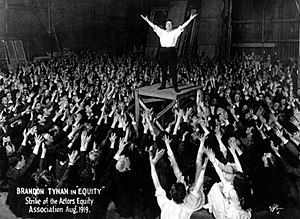| Actors' strike of 1919 | |||
|---|---|---|---|
 "Friends, Brothers, Sisters, Countrymen, lend me your ears ... Behind us we have more than five million men and women. The ship of hope – the AFL ... Now, dear public, our great public. You have always stood for justice ... Will you stand up and show that you are with us, and join us in our cry of Equity! Equity!!, Equity!!!" —Speech from the strike benefit performance[1] | |||
| Date | August 7 – September 6, 1919 | ||
| Location | New York City | ||
| Methods | Strikes, Demonstrations, Performances | ||
| Parties | |||
| |||
The 1919 Actors' Equity Association strike officially spanned from August 7, 1919, to September 6, 1919. In the late 19th and early 20th centuries, the theatre industry was revolutionized by powerful management groups that monopolized and centralized the industry. These groups created harsh working conditions for the actors. On May 26, 1913, actors decided to unionize, and they formed the Actors' Equity Association (AEA or "Equity"). After many failed attempts to negotiate with the producers and managers for fair treatment and a standard contract, Equity declared a strike against the Producing Managers' Association on August 7, 1919. During the strike, the actors walked out of theaters, held parades in the streets, and performed benefit shows. Equity received support from the theatrical community, the public, and the American Federation of Labor, and on September 6, 1919, the actors won the strike. The producers signed a contract with the AEA that contained nearly all of Equity's demands. The strike was important because it expanded the definition of labor and altered perceptions about what types of careers could organize. The strike also encouraged other groups within the theatre industry to organize.
- ^ Bernhardt, Debra E.; Bernstein, Rachel; Archives, Robert F. Wagner Labor (2000). Ordinary People, Extraordinary Lives: A Pictorial History of Working People in New York City. NYU Press. pp. 106. ISBN 9780814798669.